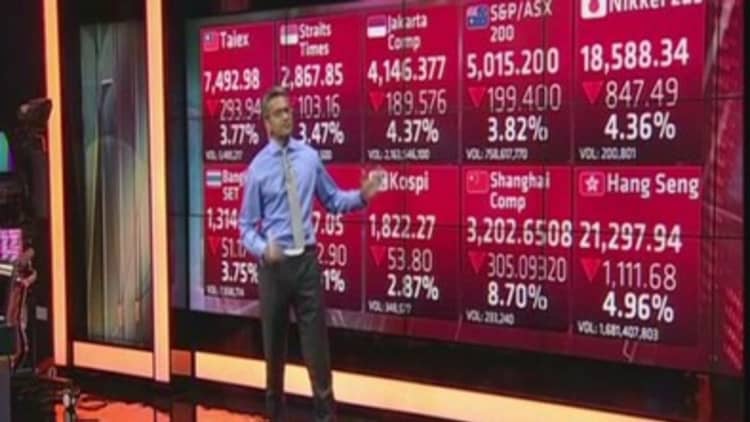
Following calls for parity against the dollar just a few months ago, the single currency is now one of the few assets in the world rallying.
Global stocks had their worst week of the year last week and the only assets to perform well were the traditional "flight to safety" assets, such as the Swiss franc, U.S. Treasurys and gold.
However, the euro has proved the surprise outperformer, appreciating 4.5 percent against the U.S. dollar in the last two weeks. It continued to gain on Monday, rallying 1.8 percent against the greenback to top $1.159 by the time European stock markets closed.
Analysts attributed the strong performance to waning fears about European economies, with one saying the euro was demonstrating "safe-haven" qualities.
Senior foreign exchange strategist at Rabobank, Jane Foley, said that shorts on the euro (bets that the currency will weaken) had been slashed of late.
"It (the euro) has certainly been behaving with safe haven qualities," Foley told CNBC.
"The market has been cutting these massive euro shorts that they built up from July of last year and all the way into March. And those shorts are around about half of the size they were in March," she later added.
The search for "safe havens" could be boosted on Monday by the rout in stocks, as investors steer clear of risk assets due to fears about the health of the Chinese economy and the upcoming U.S. Federal Reserve meeting.
More selling is anticipated on Wall Street on Monday, with U.S. stocks called a startling 700 points lower at one point, as Asian stocks crashed to multi-month lows on Monday and the Shanghai Composite closed more than 8.5 percent down.
Safe havens on the other hand, have enjoyed something of a renaissance, with gold rallying over 6 percent in the last two weeks, while U.S. Treasurys yields slid over 20 basis points to under 2.1 percent.
Among the major currencies, the and the Swiss Franc have gained 2.5 percent and 4 percent respectively against the dollar.
Meanwhile, analysts are turning increasingly bullish on the euro.
Read MoreBad news: Even after panic, stocks aren't cheap
"I think that the boost of competitiveness to Europe, plus the fall in oil prices, plus structural reforms, have meant that people have taken another look at the fundamentals and decided that some of the European countries are doing much better," fund manager and founding partner at THS partners, Cato Stonex, told CNBC.
Nomura revised its foreign exchange forecasts on Friday, with euro-dollar now seen at $1.13 by the end of the third quarter, rather than $1.05. By year-end, Nomura now sees the euro at $1.10, revised up from $1.05.
Jens Nordvig, managing director of currency research at the bank, said that with the case for a rate rise in the U.S. in September looking "shaky," a test to euro-dollar parity now looked extremely unlikely.
"We are now formalizing a new central case that the Fed delays in September and that the market will start to question lift-off in December, allowing U.S. rates to rally somewhat further than the levels observed currently," he said.
"This is one key reason why we have talked about trading targets for euro dollar in the $1.12-$1.14 range."
Foley said that the breakdown in the euro "carry trade"—where investors sell a currency with a low interest rate and uses the funds to purchase a different currency yielding a higher interest rate—also supported the single currency.
"If the carry trade won't work then the euro is not going to be used as a funding currency and therefore the euro is going to remain well supported," she said.
Chief markets economist at Capital Economics, John Higgins, agreed that the euro's strength could be linked to a shift in interest rate expectations. However, he was wary of branding it a "safe haven".
Read MoreA perfect storm, but traders look for oversold bounce
"We doubt that the euro will strengthen further. This is primarily tied to our view that events in China, and more importantly in the U.S. itself, will not deter the Fed from hiking the federal funds rate in September," Higgins said in a note to clients.
"We also think that the central bank will subsequently raise the rate faster and further than most expect. Overall, we continue to forecast a decline in the dollar-euro exchange rate to parity by the middle of next year, as a contrast in the policies of the Fed and the ECB (European Central Bank) begins to emerge."




